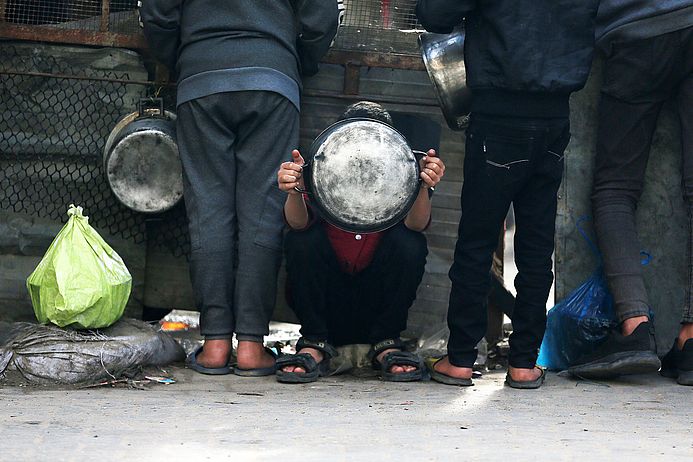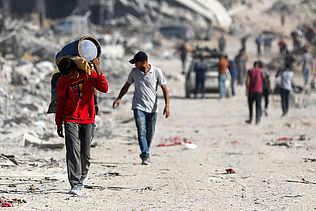“No child should look to the sky and wonder if what's falling is death or dinner”. I read on the news service X about the unbearable situation. It is not only children, who have become used to bombs falling from the sky, who find airlift unusual. In humanitarian aid, airlifts are considered the last resort. They are only used when there are no land or sea routes through which aid can be transported in a coordinated manner, for example when an area is completely cut off due to natural disasters or siege.
An occupation is no such situation, as under international law the occupying power is responsible for supplying the population in the territories it occupies. In Gaza, however, the structures that should and could provide humanitarian aid are being attacked, destroyed or their funding cut. The already insufficient aid deliveries to the Gaza Strip have collapsed in recent weeks. Although Israel has been ordered by the International Court of Justice to allow the provision of humanitarian aid in full, the passage of aid convoys has been massively obstructed for weeks.
Compared to delivering supplies by land, air aid is expensive and ineffective, a Hollywood spectacle with the accompanying demonstration of power, as emphasised by Jordanian King Abdullah II bin Hussein in an air force suit, looking grimly into the camera. But it is also a spectacle with analogies to the Second World War. Perhaps the Berlin Airlift at the beginning of the Cold War has a positive, humanitarian connotation in Europe, or perhaps the memory of its reality has been repressed. But recent history in other parts of the world still remembers George W. Bush's words in 2001: “As we strike military targets, we´ll also drop food, medicines and supplies to the starving and suffering men and women and children of Afghanistan so that people would know the generosity of America and its allies”. Already then, the airlift was criticised as a method by humanitarian experts. It requires a team on the ground to coordinate the dropped goods, the loading area is not large enough, it is difficult to predict and calculate where exactly the goods will fall, as the videos from Gaza of goods falling into the sea show. Even modern technologies do not offer effective solutions, as the Syrian case of Deir ez-Zor shows: food parcels rained down forty-four times, with just 100,000 people receiving insufficient and one-time-only supplies.
Accepting suffering
The World Food Programme recently announced that it had stopped delivering aid to the northern Gaza Strip, despite the fact that the humanitarian needs there are the greatest. This due to the breakdown of public order and the lack of a functioning "deconfliction system", a system that ensures that humanitarian aid workers and humanitarian operations are protected and not attacked.
According to UNICEF, children are already dying of malnutrition. A recent report by the London School of Hygiene and Tropical Medicine, Health in Humanitarian Crises Center and the Johns Hopkins Center for Humanitarian Health stated that even in the best-case scenario of an immediate permanent ceasefire, more than 6,500 people will die in the Gaza Strip in the next six months because the food, shelter, sanitation and healthcare situation in the enclave is so desolate. However, if the war continues, their predictions rise to between 58,200 and over 74,000 deaths.
At the beginning of March, the USA and Jordan began supplying the Gaza Strip via an airlift. This cannot happen without Israel giving the flights permission to cross its airspace. But why doesn't Israel simply allow humanitarian aid to be delivered by land or sea? Especially when more goods could be delivered significantly more affordably this way and people's survival or even lives could be saved in a much more targeted manner? The lorries are ready and fully loaded. But it is not a question of weighing up the most effective or the most humane method, because it is not a technical question. What is preventing aid is an active blockade and the political (un)will.
On 22 February – a whole week before the airlift began – Christopher Lockyear, President of Doctors Without Borders, addressed the UN Security Council: “Madam President, the humanitarian response in Gaza today is an illusion – a convenient illusion that perpetuates a narrative that this war is being waged in line with international laws. Calls for more humanitarian assistance have echoed across this Chamber. Yet in Gaza we have less and less each day—less space, less medicine, less food, less water, less safety. We no longer speak of a humanitarian scale-up; we speak of how to survive even without the bare minimum. Today in Gaza, efforts to provide assistance are haphazard, opportunistic, and entirely inadequate”.
Lucrative dehumanisation
People are at the end of their strength, of course they run to any sign of help. Most recently, they were met with bullets instead of flour. The very fact that they have to run for food violates all the basic principles enshrined in international humanitarian law. Alongside international law, one of the most important principles of (humanitarian) aid is the do-no-harm approach. In short, this means that aid should not cause harm.
Given the current conditions in Gaza, it is almost cynical to write about it. But what the airlift and other uncoordinated supposed aid efforts perpetuate is a further dehumanisation of the people in Gaza: the Hollywood image of the brown, hungry, uncivilised masses. A naked life, as the Italian philosopher Georgio Agamben might describe it. This "naked life" without rights, because it is outside the law, remains unprotected as such and, in the exceptional case mentioned, is simply life that is tormentable and killable under the gaze of the sovereign. It is no wonder that the film "Hunger Games" is associated with Gaza on social media.
Why a feminist foreign policy, that Germany is supposedly following since last year, which calls for feminist humanitarian aid does at least criticize the situation, remains questionable. After all, it is women and girls in Gaza in particular who suffer most drastically from uncoordinated aid, the war and it´s consequences. Where is gender-sensitive humanitarian aid here? Not to even mention a feminist critique.
For the USA and Jordan, the airlift offers a spectacular opportunity to join the good guys' club and for the USA to relieve itself of the burden of continuing to exert political pressure on Israel to allow humanitarian supplies to pass through adequately. US President Joe Biden can also make good use of such a spectacular act in domestic politics ahead of the elections. While the king in Jordan uses the same images to try and restore his lost political and social capital in front of the almost three million Palestinians in his country.
And what if, as a result of the uncontrollable drops, the goods now end up in the wrong hands or only benefit the fastest and strongest and not those most in need? The self-justification is already embedded in the act: "We only dropped the packages." And perhaps George W. Bush's words are murmured afterwards with a determined gaze from another mouth: We wanted "people to see the generosity of America and its allies".



